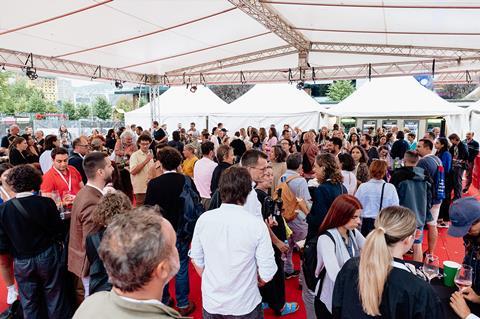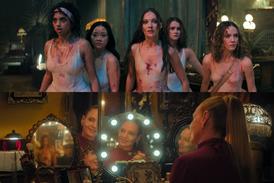
Romanian director Raisa Razmerita’s Electing Miss Santa pitched in the Docu Rough Cut Boutique strand of CineLink, the industry platform of the Sarajevo Film Festival, was one of the stand-out projects of this year’s event, according to international attendees.
The film follows Elena, a struggling farmer in a Moldovan village who decides to run for mayor.
“I can’t remember the last time a marketplace presented such a compelling protagonist as Elena Santa,” said Polly Haythornthwaite, digital coordinator at the UK’s Java Films. “The film’s unique perspective comes not just from its focus on a rural village in Moldova, but the way it broaches the fascinating and difficult dynamics between three generations of women as they encounter change and conflict in both personal and public spheres.”
“I felt very connected to Elena, she seems to be a universal character that could speak to an international audience,” said Michaela Cajkova, founder of Prague-based world sales company Filmotor. “I definitely want to see the whole film and consider it.”
The film is being produced by Ion Gnatiuc of Romania’s HaiDOC Productions. It is looking for a further €50,000 of its €230,000 budget and searching for a sales agent as well as a festival world premiere for a 2025 launch.
Three attendees picked out the same trio of projects in the Docu Talents from the East strand, organised by Ji.hlava Documentary Film Festival and for projects from Central and Eastern Europe in production or post-production.
Acquisitions executive Tijana Djukic of Current Time TV, Petra Babic of Croatian distributor Restart and Cajkova all noted Baltic UXO, about the legacy of Second World War munitions dumped in the Baltic Sea, After The Storm, about two Lithuanian fisherman and amber searchers, and Amoosed, about director Hana Novakova’s attempt to discover moose lovers around the world.
Djukic praised Amoosed for its “witty humour and creative approach to wildlife documentary storytelling”, while Babic called After The Storm a promising debut feature from Lithuania-based Francesco Rufini, and praised the cinematography of it and Baltic UXO.
Filmotor’s Cajkova said the latter two titles “can really fit our editorial line – they are both bold in their narrative structure and both are touching environmental aspects”.
Haythornthwaite credited CineLink for the structure of the documentary strands. “The formats worked well in serving both filmmaker and decision maker,” said the exec. “It’s not always the case that you get the opportunity to delve into such a varied selection of projects in such detail.”
Fiction favourites
The fiction projects to catch the eyes of international guests included Mina Mileva and Vesela Kazakova’s Mather/Papan, about an overweight gender-fluid person in Bulgaria who writes slogans for sex toys, and aims to have a child.
“It was inventive, funny, but on a serious subject,” said Kristina Borjeson, head of production at Sweden’s Film i Vast.
Borjeson was also impressed by two further Co-Production Market entries, both from Turkey – Divine Poison “for its ambition to describe a complicated situation without judging” and Toz Baba “for its energy and wish to tell a serious and complicated story to a young audience on their terms.”
Aida Begic’s Bosnia & Herzegovina-Serbia co-production Air In A Bottle won the Film Center Serbia award at the CineLink ceremony
The film follows a woman returning from Germany to her home city of Sarajevo, where her gambling addiction threatens to destroy her efforts to rebuild her relationship with her estranged daughter.
Sylvie Leray, founder and producer at Spanish firm Reverso Films, said, “It combines well the local story with a high cross-border potential. The themes of return to homeland, cultural and generational conflict, hope of a new start, post-war fractures and family distance can touch a worldwide audience in an arthouse style.”
As head of distribution for Mexican distributor Piano, Ester Bernal travelled further than most to Eastern Europe. She picked out Ge Zhang’s Hungarian title My Turn! and Maya Vitkova-Kosev’s One Month from the Work in Progress strand, believing both “have an interesting potential to find their place in the industry”.
Tajana Kosor, sales executive at Greece’s Heretic, noted three Work in Progress titles: Ana Urushadze’s Supporting Role, Tarik Aktas’ Kriegsausgabe and Igor Jelinovic’s Honey Bunny, describing the latter as “a deeply felt character film, with an elevated performance by the lead actress”.
Two-and-a-half years after the full Russian invasion, Ukrainian projects about the war continue to attract attention. Dmytro Hreshko’s Divia, about the destruction of the country’s natural beauty, was praised by US-based curator Faridah Gbadamosi and Andrea Wink, founder of Germany’s Exground Filmfest.
Several attendees picked out Frontline by Alisa Kovalenko, documenting her own experiences as a mother, soldier and filmmaker during the war.
In CineLink Drama, Teona Mitevska and Sonja Prosenc’s Little Yugoslavia, following a mother and daughter vampire duo in a post-socialist apartment complex, impressed attendees. Film I Vast’s Borjeson said it was “a super clever and intriguing way of telling a story in former Yugoslavia that can take place almost anywhere in Europe”. Djukic of Current Time TV added it showcases “remarkable artistry and storytelling.”
Festival experience
Several industry participants to whom Screen spoke said they found the CineLink Talks programme very useful. Mihajlo Popovic of Serbia’s Taramount film said the session on literary adaptation “cohesively shed light on the intricacies of adapting books, leaving no stone unturned”; while producer Frank Mannion of the UK’s Swipe Films said the multiple AI sessions “moved the discussion beyond the tendency to be defensive about the implications of AI, to how it can and should be adopted by producers”.
Sarajevo expanded its footprint this year, taking up new space in the Marijin Dvor business district.
“It was nice to see CineLink grow in scope with each year. Its move to the Swissotel and the addition of the Festival Garden were great operational moves,” said Gbadamosi, in town for the third time.
“The new hub combined with the pleasant Festival Garden events worked well,” said Mannion, who also praised the festival’s On Demand VOD platform.
“Always a perfect place to meet people from the region, and the way it is organised with lunch and drinks makes it easy to work. All in all a great stay,” said Borjeson. However she noted the main industry room at the Swissotel was “too crowded sometimes with even the juries having to sit in there in meetings”.
Organisation was a concern for one sales agent, who asked to remain anonymous. “There are still bottlenecks [of simultaneous events], different or missing schedules shared with different execs,” they suggested.
The person also felt the shuttle service for moving guests between festival areas was “a disappointment – it didn’t bother stopping at collection points”.
The festival did make full use of its new garden, hosting drinks events for France’s CNC, plus the Croatia, Montenegro and Slovenia film centres respectively. A gathering at the UK ambassador’s residence returned for the first time since the pandemic, with speeches by festival director Jovan Marjanovic and BFI UK Global Screen Fund head Denitsa Yordanova.
“It was a great opportunity to showcase the competitive incentives the UK now offers international filmmakers,” said Mannion.

























No comments yet